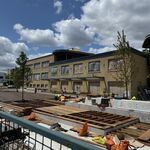We also import agricultural products because we do not have permanent crops in Canada. Take a look at what we produce and export on a large scale: barley, sugar beets, oats, flax, maize, canola and rye. There are relatively few regions for growing fruits and vegetables. Sure, we could build massive pig farms to vastly increase meat production, but that does not increase the quantity of arable land - or the fact that you can't grow crops year-round in this country. Meeting the needs of just over thirty million people is one thing; doing the same for one-hundred million or more is different.
Okay, two points: Firstly, that's what has always been done and there doesn't seem to be a problem with it. Okay, so we can't grow bananas here. That doesn't mean that nobody should be living here. Again, look at the country in terms of as a part of the world. If we have less land to grow fruit and vegetables, that means we export our grains to other countries, where they can use their warmer, moister or more fertile land to grow fruits and vegetables to sell to us. I don't think there's a country in the world that produces all of the food it's people eat.
Also, vegetables are the most logical crops to grow using greenhouses, hydroponics and urban agriculture. In the valleys in BC, lack of arable land space could be offset by an abundance of water and easy power, meaning easier hydroponics and greenhouse building, along with the obvious beautiful geography and warm climate that people might find attractive.
Regardless, why is an accelerated population so desirable? Is it a power thing? Besides, what difference does immigration make over an increased birth rate? You have not clarified that. Are you expecting all new immigrants to Canada to then be celibate?
Read back in the thread please. I personally don't think that we should be growing our population for economic or political reasons, and I think the greatest benefits are socially.
More immigrants is way, way more favourable than more Canadians giving birth. By taking immigrants from other countries, you achieve the same end while at the same time not creating new mouthes to feed and giving people better lives. And it's a kind of big trend in the country that new immigrants don't give birth nearly as much as they might in their homelands. And they'd be giving birth whether they're in the country or not, so even if they don't slow natural growth rates, it's not like things are any worse off.
A higher population is good for the country's social state. It gives a density of scale that allows things like better infrastructure and specialization. It also allows you to get what many consider a desirable built form of your country with people living everywhere, in little houses in the country, small towns, bigger towns, more cities, etc. Haven't you heard all of those oh-so funny jokes that people make about the prairies being the middle of nowhere? There's still people living there, more than the Sahara or Canadian Shield (though funnily enough, not more than the Himalayas,) but it's such a low population that they can't support the social structure of things like vibrant towns, interesting and varied culture, infrastructure like public transit or efficient sanitation systems, or just a lot of people to befriend and diversify the social fabric that you interact with on a daily basis.
You are overestimating your ability to make projections about the future. For example, how do you know that the global population will stabilize? You presume that moving people from one part of the globe to another will somehow make population "remain the same." It's not at all clear that this would be the case.
So you're saying that if you take someone from China and put him in Toronto, he'll disappear off of the earth? Wow! Or perhaps taking someone from China and putting them in Toronto will make him multiply? The point is that the earth is a very finite object. Everyone on the world needs to eat. The world is producing enough food for them to eat. By taking one person on earth and putting them in another place, you're not taking away the earth's ability to sustain them.
If you accept that there is an overpopulation, then you would understand that shifting populations is not a solution to overpopulation.
If you take someone from India and put them in Canada, it's making India less crowded. Relative to the rest of the Earth, Canada is underpopulated. By stopping people from migrating to this sparsely populated country, even the southern part that's highly comparable to the Eurasian Steppe, Europe, or Japan, we're in a way reducing the livable space on Earth.
Sorry to say, but that appears to be questionable thinking. You have not defined your terms in any realistic sense. Besides, it's not an issue of comparison. You might want to avoid what you refer to as "the Great White North" but you can't. It's simply far too costly to try and populate the northern most regions of this country, so it's not going to happen. Climate and geography are always very real factors. It's not simply a case of comparing land mass to land mass. If you ever venture up to the Yukon, Nunavut, the Northwest Territories or North-Central Quebec, you will understand why there are less than 170,000 people in those areas of the country (because the north is the source of the low population density of Canada). Overall, that means that roughly forty-eight percent of Canada has 0.5% of the population - due to climate and geography.
How many times to I have to say this?
I don't think people should live up north. That that region should remain untouched as possible. When I say that Canada has room for plenty of more people, I'm just talking about the most densely populated parts of our country; the Quebec-Windsor corridor, the southern Rockies in BC, the Maritimes, and the Prairies. And comparing these regions to other places on earth, comfortably populated places like Europe or South America or the Eastern US, we have a very low population density. I've pointed this out with several examples, comparing the Prairies to the Eurasian Steppe or Northern China which both have similar climates and basically the same geography, and comparing BC with Japan, which has a climate that's maybe 4 degrees warmer in the winter, but the same rocky, mountainous geography that southern BC has. Yet southern BC has fractions of the density of Japan, like 1/20th of the population even though the 3rd largest city in the country is in BC. And the prairies also have fractions of the density of the Eurasian Steppe, even though this is located in one of the most unstrategic positions on earth with very, very low industrial development.




